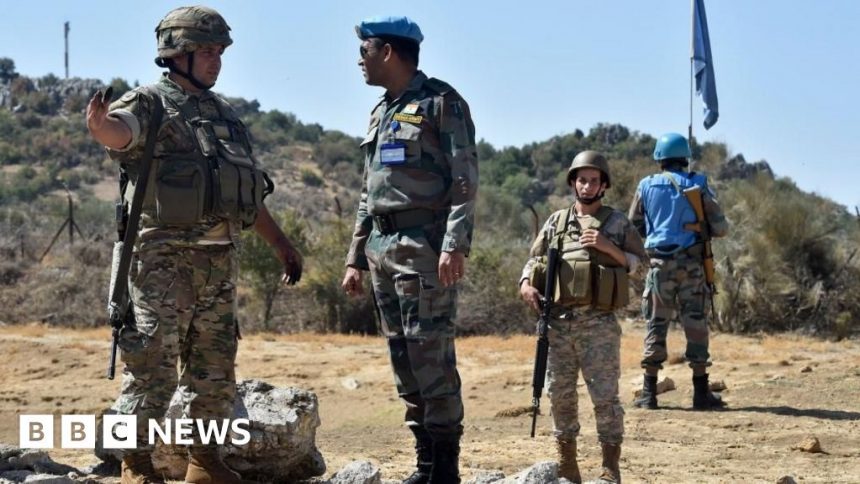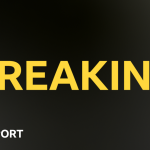Israel’s row with UN over Lebanon peacekeepers driven by long distrust
 EFE
EFETensions between Israel and the UN over its peacekeeping operations in southern Lebanon have escalated in recent days – although the confrontations have their roots in years of mistrust and recriminations.
In the latest standoff, the head of UN peacekeeping operations rejected a call on Monday by Israeli Prime Minister Benjamin Netanyahu for the forces known as Unifil to pull out of “combat areas”.
The UN force was established in 1978 after the Israeli invasion of southern Lebanon, and had its role bolstered in 2006 to monitor and keep the peace there after that year’s war between Israel and Hezbollah.
I’ve filmed with UN peacekeepers patrolling the 120 km (75-mile) “Blue Line” – the UN-recognised boundary that separates Israel and Lebanon – and have seen the dangerous work of demining 5 million square metres of land in southern Lebanon, where Unifil has destroyed more than 51,000 mines and unexploded bombs left over after previous wars.
But Israel accuses Unifil of falling woefully short in one of its other key responsibilities. Under UN Security Council Resolution 1701, which ended the 2006 war, the UN was meant to create an area in southern Lebanon free of armed forces other than those of the Lebanese army.
“The UN is a failed organization and UNIFIL is a useless force that failed to enforce Resolution 1701, failed to prevent Hezbollah from establishing itself in southern Lebanon,” said Israeli cabinet minister Eli Cohen in a recent social media post.
Israel accuses Unifil of having turned a blind eye to Hezbollah’s extensive regrouping and rearming, as the Iranian-backed Shia organisation grew into a formidable fighting force – even bigger than the official Lebanese army. Hezbollah is now proscribed as a terrorist organisation by Israel, the UK, US and other countries.
According to the pro-Israel pressure group, UN Watch, Unifil “did nothing” as “Hezbollah was digging tunnels to invade Israel, kidnap & attack Israeli civilians… and embedding missiles in civilian homes.”
UN Watch and the Israeli Government’s Media office have published several posts in recent days alleging that Hezbollah had been able to operate freely and within clear sight of UN bases and posts along or near the Blue Line.
Tunnels, heavy weaponry and equipment in preparation for attack on Israel have all been discovered after Israeli troops crossed the border into Lebanon.
That, said a belligerent Benjamin Netanyahu, in a video message addressed directly to the UN secretary general this week is why Israel is demanding that Unifil forces withdraw from conflict areas in southern Lebanon.
The Israeli prime minister urged Antonio Guterres not to allow Hezbollah to use UN peacekeepers as “human shields” and said the secretary general’s refusal to evacuate the Unifil soldiers makes them “hostages of Hezbollah… endangering them and the lives of our [Israeli] soldiers”.
Israel was widely criticised after five Unifil peacekeepers were injured following the ground invasion on 1 October.
In several incidents Israeli fire has hit clearly marked and unmistakable Unifil bases, and in one case Israeli tanks forced their way into a Unifil compound where they initially refused demands to leave.
Israel has offered explanations for those incidents but, again, says the way to avoid a repetition is for Unifil troops to withdraw from the area.
That has been met with a firm “No”.
A Unifil spokesperson accused the Israeli military of “deliberately” firing on its positions and 40 of the nations that contribute troops to Unifil said last week that they “strongly condemn recent attacks” on the peacekeepers.
The UN Security Council, meeting in New York, also “urged all parties to respect the safety and security of Unifil personnel and UN premises,” said Switzerland’s UN Ambassador Pascale Baeriswyl. She added: “They reiterated their support to Unifil, underscoring its role in supporting regional stability.”
 Reuters
ReutersThere are UN bodies also trying to hold Israel to account in Gaza, where for the last week Israeli troops have been involved in an enhanced offensive to drive remaining Hamas fighters from northern areas, including the Jabalia refugee camp.
The Israel Defense Forces (IDF) say that they have issued clear orders for thousands of civilians to leave the conflict zone for so-called “safe areas”.
But with as many as 400,000 people trapped in the north, few areas in Gaza can be considered “safe” and, according to many reports, more than 300 people have been killed in Israel’s latest offensive.
That led the United Nations Human Rights Office to issue a strongly worded statement saying that the IDF was “trapping tens of thousands of Palestinians, including civilians, in their homes and shelters with no access to food or other life-sustaining necessities.”
The statement also accused Israel of cutting off the area completely from the rest of Gaza and said that Israeli troops have fired on civilians trying to flee the area which could amount to a “war crime.”
Israel says it is sending more food and medical supplies into northern Gaza and that Hamas is actively encouraging, even preventing, civilians from leaving Jabalia.
For many in the current Israeli administration, the bottom line is that – for many years – the United Nations and its organisations have been inherently and structurally anti-Israel
Israel is now taking unprecedented legal action against UNRWA – the UN body established more than 70 years ago to support Palestine refugees across the Middle East, including Gaza and the West Bank.
Israel has long-accused Unrwa – the UN body established more than 70 years ago to support Palestine refugees across the Middle East, including Gaza and the West Bank – of actively acting against its interests.
It says Unrwa personnel were directly involved in Hamas’s 7 October attacks, when thousands of gunmen broke through the border fence from Gaza and killed about 1,200 people in southern Israel and took another 251 back to Gaza as hostages.
 Reuters
ReutersThe number of Unrwa personnel accused of participating in the attacks was 12, out of a 13,000-strong workforce.
Israel’s Ambassador to the UN, Danny Danon, told the Security Council that Unrwa had allowed Hamas to infiltrate its ranks and that “this infiltration is so ingrained, so institutional, that the organization is simply beyond repair.”
To that end, a committee in Israel’s parliament has now approved legislation that would ban Unrwa from operating in Israeli territory and end all contact between the Israeli government and the agency.
Unrwa’s head responded, saying that if the legislation is adopted, the body’s humanitarian operations in Gaza and the West Bank may “disintegrate.”
Philippe Lazzarini said that senior Israeli officials were “bent on destroying Unrwa” which is the main provider of humanitarian aid in Gaza. It runs schools, primary healthcare centres and social services for the vast majority of Gaza’s population of 2.2 million people.
But criticisms from the UN and its member nations will not deter Israel from achieving its military objectives in Gaza and Lebanon, nor in the occupied West Bank as long, crucially, as it enjoys the backing of the United States.
Remarkably, Israel has gone as far as barring the UN Secretary General from entering the country. Foreign Minister, Israel Katz, saying that Antonio Guterres was now persona non-grata after not “unequivocally” condemning Iran’s missile attack on Israel. The move prompted Mr Guterres to insist that he “strongly condemn[ed]” the attack, although the “ban” has not been lifted.
While Israel might owe its very existence to the UN – the body that voted it into being in 1947 – its relationship with the organisation has never been so bad.






